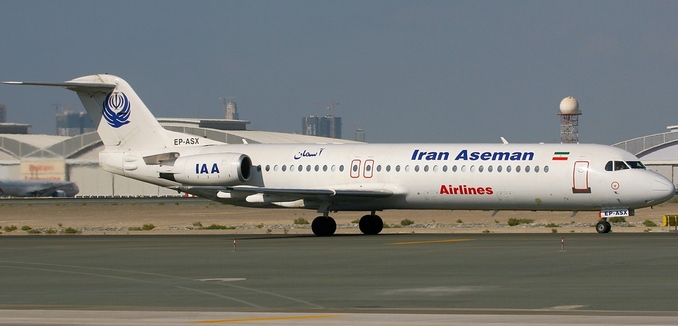Iran is continuing to send troops and weapons to Syria using “pseudo-civilian aircraft,” an analyst specializing in Iran and the Persian Gulf warned Thursday.
In order to support the regime of Syrian President Bashar al-Assad, Iran’s Islamic Revolutionary Guard Corps (IRGC) has set up “its own covert airlines and service companies to provide logistical assistance and boost revenue,” Farzin Nadimi wrote in a briefing for the Washington Institute for Near East Policy.
These airlines include Pouya Air and Qeshm Fars Air. The IRGC also uses planes from established airlines, such as Iran Air and Mahan Air, to provide support for Assad’s forces.
Flights traveling between Iran and Syria “are scheduled for nighttime in order to hinder satellite monitoring,” Nadimi explained. “Besides the busy Tehran-Damascus route, three airlines (Mahan, Iran Air, and Syrian Air) also visit Abadan Airport intermittently. There, Iraqi Shiite militia forces are bused in from Najaf and Basra to be flown to Damascus.”
Altogether, Nadimi estimated, “Iranian and Syrian airlines have hauled about 21,000 passengers between Tehran/Abadan and Damascus in the past two months alone, along with over 5,000 tons of supplies.” The IRGC operates these flights, which are not available to the general public.
Nadimi compared the IRGC’s use of civilian airlines to the way the former Soviet Union employed its national airline Aeroflot to carry out its “political and military objectives worldwide.” While the Soviet Union’s use of Aeroflot was “vastly superior” to Iran’s use of its airlines for military purposes, Iran is working to improve its capabilities, Nadimi added.
With the planned sale of planes by Boeing and Airbus to Iranian carriers, the IRGC should have many more jets at its disposal. However, if Iran Air or Aseman Airlines get involved in joint operations with Mahan Air or other designated entities, they could be subject to sanctions.
In a policy brief written this week for the Foundation for Defense of Democracies, Emanuele Ottolenghi and Saeed Ghassiminejad raised concerns that the CEO of Aseman Airlines, which just signed a deal to purchase at least 30 Boeing planes, has longstanding ties to the IRGC. They recommended that the sale to Aseman be held up until its CEO is proven to no longer be working with the IRGC.
Sen. Marco Rubio (R – Fla.) and Rep. Peter Roskam (R – Ill.) sent a letter earlier this week to President Donald Trump asking him to cancel the licenses allowing Boeing to sell planes to Iran, asserting that “as the main benefactor of Bashar al-Assad—whose regime has once again used chemical weapons to kill scores of men, women and children—Iran has consistently used commercial aircraft to transport the weapons and troops that have fueled the conflict in Syria which has claimed the lives of nearly 500,000 people.”
Iran Air was designated by the U.S. Treasury in 2011 partially due to its transport of “potentially dangerous Islamic Revolutionary Guard Corps (IRGC)-related cargo” and “missile or rocket components” to Syria. Although there are indications that Iran Air is still ferrying arms and personnel to back Assad in Syria — in June, the airline flew known weapons resupply routes to Syria three times — sanctions against it were dropped as part of the 2015 nuclear deal.
A Western intelligence report seen by Reuters in 2012 noted that Iran continued using civilian aircraft to transport large amounts of arms and personnel to aid Assad.
[Photo: Konstantin Von Wedelstaedt / WikiCommons ]




